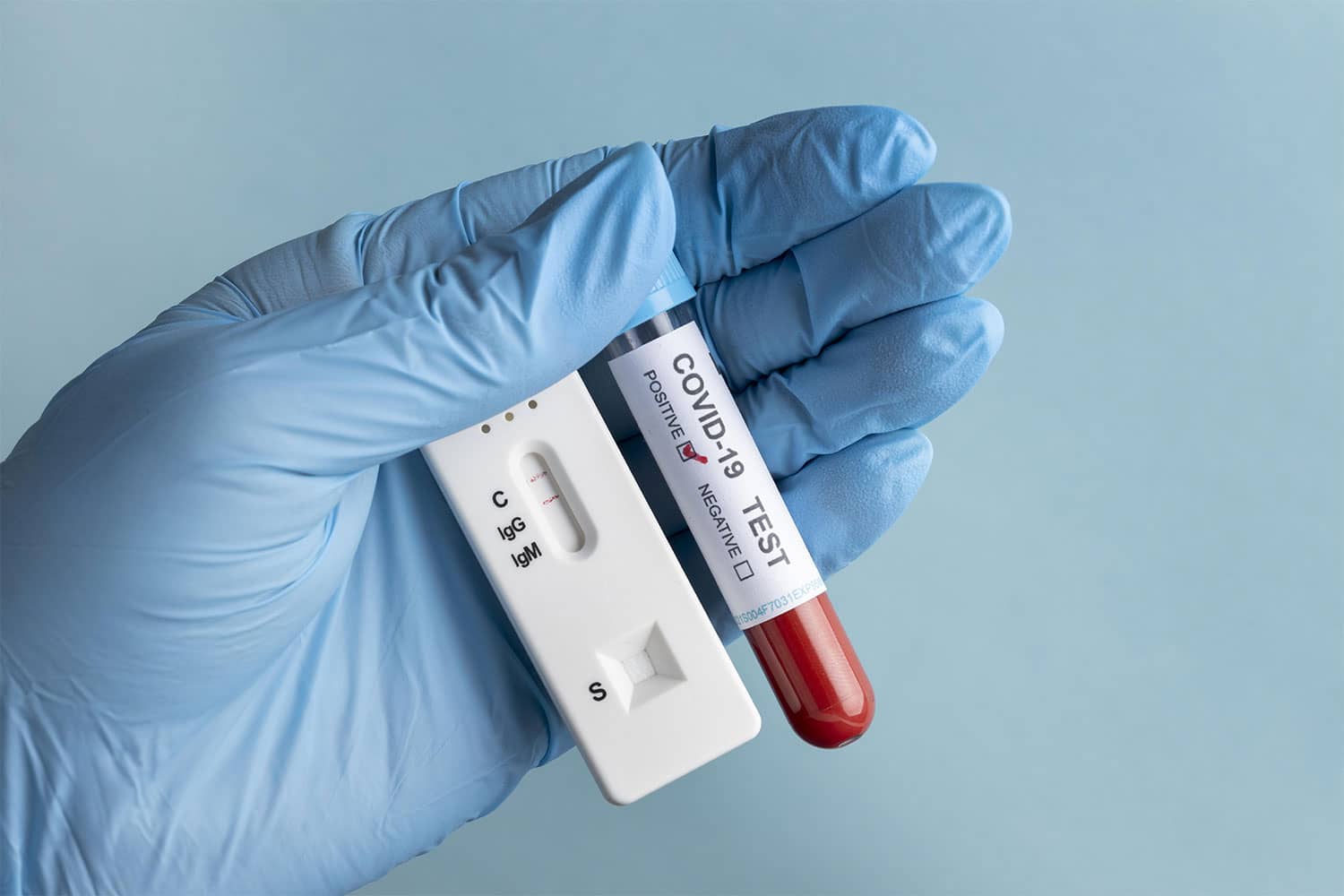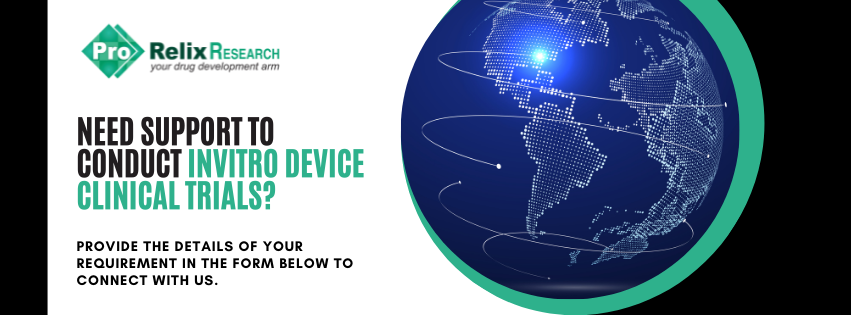Diagnosis of diseases by clinicians using suitable tests guides treatment decisions and is necessary for improving and prolonging the health and well-being of patients. ProRelix Research partners with you to provide clinical trial support and ensure your device meets regulatory, safety, and effectiveness requirements to allow for faster approvals and market access.
The World Health Organization (WHO) defines in vitro diagnostics (IVD) as tests that can detect diseases, conditions, and infections. The United States Food and Drug Administration (FDA) extends the definition of in vitro diagnostic products to include reagents, instruments, and systems intended for use in diagnosis of disease or other conditions, including a determination of the state of health, to cure, mitigate, treat, or prevent disease. IVDs are defined as devices (instrument, apparatus, implement, machine, contrivance, implant, in vitro reagent, or other similar article) under Section 201(h) of the Food, Drug, and Cosmetic Act, and may also be biological products subject to Section 351 of the Public Health Service (PHS) Act. Unlike most other medical devices that function on or in a patient, IVDs include equipment that are used to collect, prepare, or analyse specimens (blood, serum, urine, spinal fluid, tissue samples) after they are removed from the human body. The significance of IVD devices has especially increased in the COVID-19 pandemic era wherein diagnostic tests such as antigen tests, nucleic acid amplification tests, antibody and adaptive immune response tests, and tests for biomarkers of inflammation are critical for the diagnosis and management of the disease.
Like medical devices, IVDs are divided into three classes, Class I, II, and III with an increasing level of regulatory control by the US FDA.
Class I IVD devices pose the least amount of risk to the consumer and are subject to general controls such as good manufacturing practices, labeling, registration, recordkeeping, and premarket notification. Examples include specimen receptacles, laboratory instruments, and buffer solutions.
Class II devices to general and special controls such as performance standards, post market surveillance, patient registries, special labeling requirements, premarket data requirements. These devices are subject to submission of a premarket notification or 510(k) pathway which involves demonstration of substantial equivalence in terms of safety and effectiveness to a legally marketed or predicate device. In case of absence of an equivalent marketed product, sponsors can file for a ‘de novo’ 510(k) request requiring proof of safety and efficacy. The 510(k) review process for IVD devices includes evaluation of the analytical performance characteristics of the new device to the predicate such as bias or inaccuracy, imprecision, and analytical sensitivity and specificity. In some cases, prospective clinical studies may be required for Class II IVD devices. Some examples include X-ray machines, fetal monitors, and dialysis machines.
Class III devices present the highest level of risk to the patient and are subject to Investigational Device Exemption (IDE) application and premarket approval (PMA) requirements. The PMA process requires data from laboratory and clinical studies and is analogous to a new drug approval (NDA) for pharmaceuticals. It is more extensive and stringent than the 510(k) process. The safety of IVD devices is related to the impact of false positive or false negative results on patient health. Some examples include biomarker diagnostic tests, genetic tests, and HIV diagnostics tests.


The European Union Medical Device Regulation (EU MDR) and Central Drugs Standard Control Organization (CDSCO) in India classifies IVD devices into 4 classes, namely Class A, B, C, and D in order of increasing patient and public health risk.
Since IVD devices are tested outside of the body, there are some differences in clinical trials for IVD devices and other medical devices related to remote monitoring, number of sites, and informed consent. The focus of clinical evaluations for IVD devices is focused on determination of IVD performance using analytical parameters making it essential to have strong statistical support.
At ProRelix Research we understand the importance of IVD devices and help you navigate the appropriate regulatory process to understand the types of clinical evaluations necessary to bring your product to market. Our services include:
- Device classification and choice of appropriate regulatory pathway
- Determination of type of clinical evaluations for safety and effectiveness
- Assistance with development of a 510(k) submission: substantial equivalence package for 510(k) applications based on technological characteristics, performance characteristics, analytical studies and non-clinical bench performance compared to a predicate device
- Clinical trial support
- Study design and Protocol Development
- Site selection and qualification
- Remote site management activities
- Vendor management
- Laboratory feasibility and startup
- Audit preparation
- Local informed consent approvals
- Medical writing: creation of a clinical investigational plan, protocols, case report forms, investigator’s brochure, informed consent forms, clinical investigation reports
- Training programs: study-specific training for site personnel
- Study monitoring and management activities: initiation, interim monitoring and close-out monitoring visits, maintenance of site files, ensure compliance with global and local regulations and quality programs, safety monitoring, deviation management and Corrective and Preventive Action (CAPA) programs, ‘mock’ audits and preparation for audits
- Data management: database lock and data transfer, database maintenance and archival, validation of electronic databases, design of electronic CRF (eCRF)
- Statistical analysis: statistical analysis plan (SAP) development, statistical analysis, analytical validation parameters
- Safety management
Need Support to Conduct your In Viro Diagnostics Clinical Evaluation?
We’d be delighted to assist you in conducting your In Viro Diagnostics Clinical Evaluation
Connect with our experienced staff today!!
Provide details of your requirements by clicking on the given link below and our professional team of clinical research experts will get in touch with you right away.




